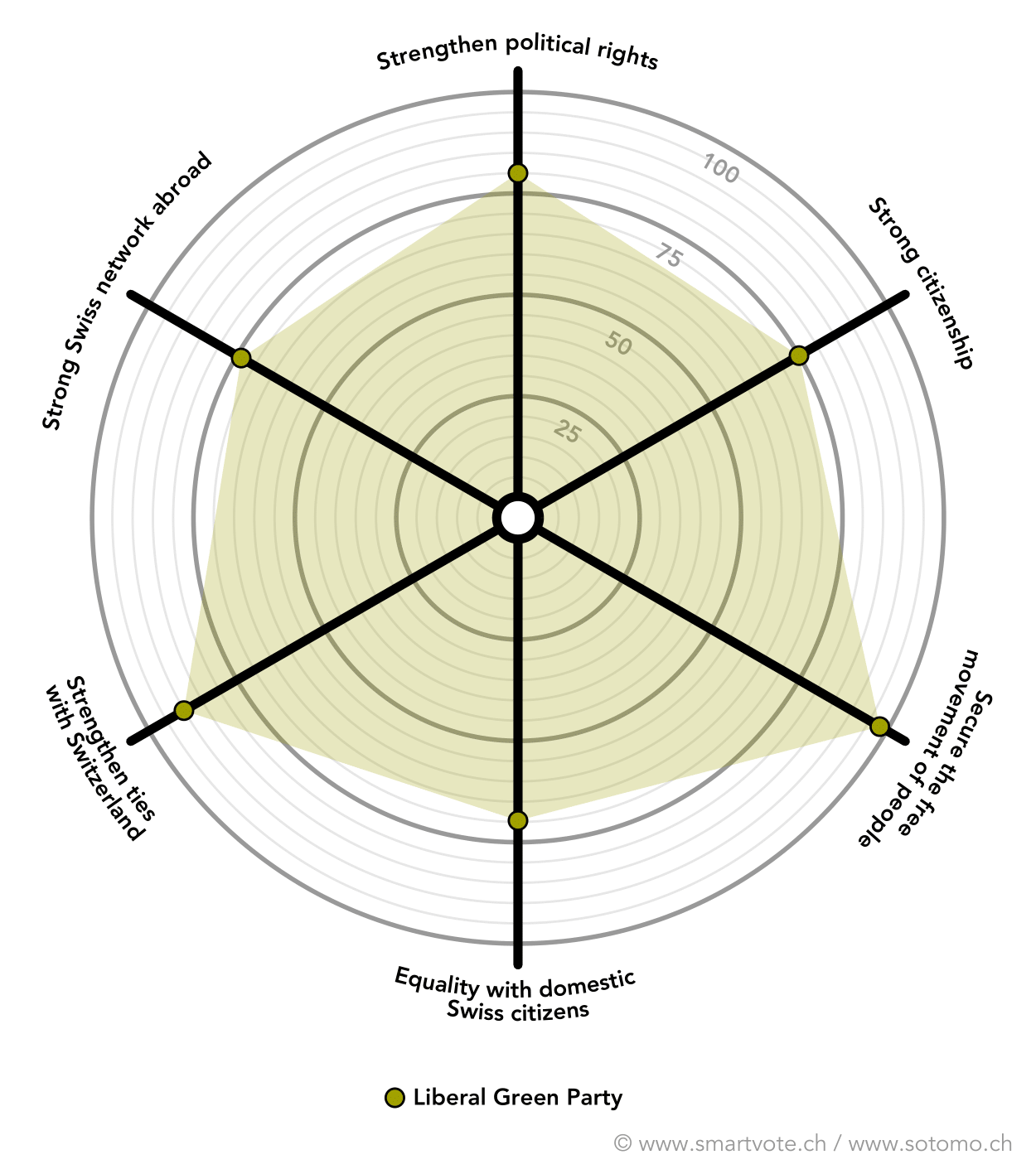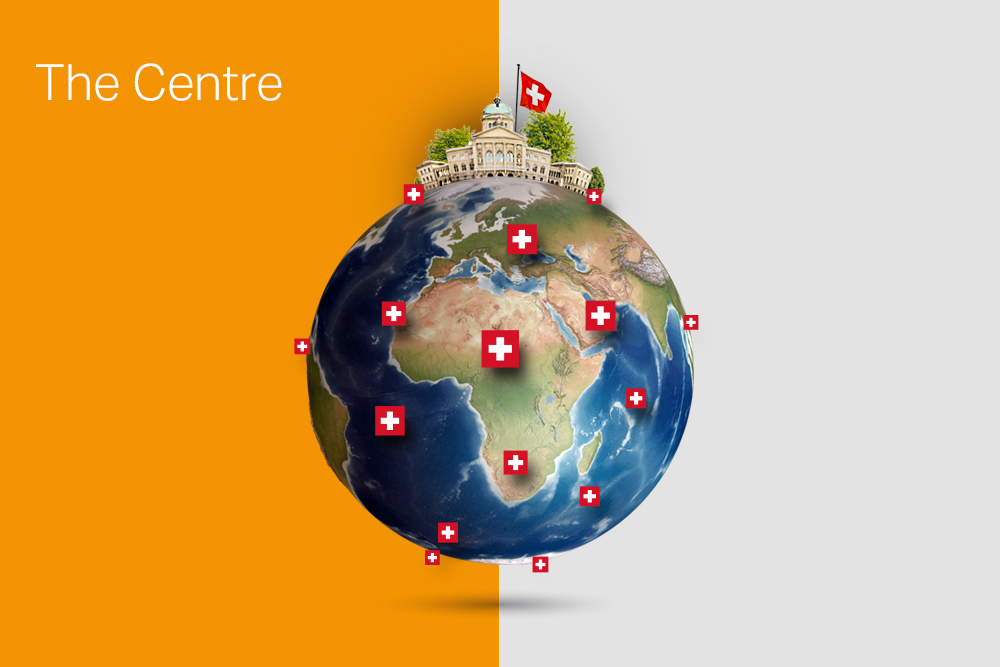Liberal Green International: new and motivated

The centrist Liberal Green Party has the newest international section, but it has a close affinity to the common issues of the Swiss Abroad. Section president Thomas Häni talks about e-voting and the core questions concerning banking and health insurance.
The international section of the Liberal Green PartyExternal link was only constituted last autumn, making it the most recent arrival on the Swiss Abroad political stage. Despite this, it’s by no means a complete newcomer to the scene. In the previous parliamentary elections in 2019, party member Franz Muheim managed to take almost 45,000 votes in the United Kingdom – a striking result.
“We’ve managed to draw up Swiss Abroad lists for each of the cantons of Basel City, Bern and Zug,” says Häni, president of the Liberal Green Party International, who lives in Germany. Direct representation of the
Swiss Abroad is still a long way off, but would be a good thing, he says. “The perspective on Switzerland from the outside is beneficial.”
- Swiss Liberal Green Party
- Founding year: 2007
- Presidency: Jürg Grossen, parliamentarian of Canton Bern and entrepreneur
- Federal Council (government) posts: 0
- Membership: 7,800
- Proportion of seats in parliament:
- 16 seats in the House of Representatives (8%)
- 0 seats in the Senate
- Vote share 2019: 7.8%
- Proportion of women in the Federal Assembly: 50%
- Political position – three core issues:
- climate protection and ending dependency on fossil fuels.
- opening the country’s foreign policy, above all towards the EU.
- a liberal economic policy – the state should promote individual responsibility and provide fair starting conditions. (SRF)
The Liberal Green Party International has around 80 members and as many supporters. The founding of the international section was clearly undertaken with a view to the upcoming elections in autumn.
“Four years ago we’d already seen that the number of Liberal Green Party voters was larger among the Swiss Abroad than among those eligible to vote in Switzerland,” Häni says. Considering the noticeable interest in the party abroad, the founding was a logical step, he explains.

The main objectives
In terms of the Swiss Abroad, Häni sees the main advantage of the Liberal Green Party vis-à-vis the other parties in its size. “Because we’re relatively small, our parliamentarians are responsive to the mood in the party.” That way, the issues that concern the Swiss Abroad find direct expression in parliament.
The section subscribes to the main objectives of the mother party, whereby the Liberal Green Party International sets a particular emphasis on the European Union and the framework agreement between Switzerland and the EU.
“The collapse in negotiations translated into a lot of popularity for our party from the Swiss Abroad,” according to Häni. There were a lot of reasons for the shift in interest, but in his opinion one of them was the alternative proposal to join the European Economic Area (EEA) . “The Liberal Green Party was the only party to actively introduce the idea,” he says.
In addition, a large proportion of Liberal Green voters have an academic background. “In terms of their professional careers, a lot of them depend on being able to undertake research or to study in neighbouring Europe,” Häni explains. This also explains why Horizon Europe is a key priority for Liberal Green Party International, with Switzerland being excluded from the EU research programme after the collapse of the framework agreement negotiations.
This doesn’t mean that the traditional topics that interest the Swiss Abroad such as social insurance, return to Switzerland and participation in elections and referendums are off the radar. “These are all issues that we’re trying to include prominently in our party programme.”
On e-voting
The Liberal Green Party International is disappointed that the most recent e-voting trials were only test runs and that electronic voting can’t be fully rolled out for the parliamentary elections in autumn.
“We’re convinced that e-voting is vital, not just for the Swiss Abroad,” explains Häni. “It would also help to encourage young voters to get to the ballot box.”
Häni’s hopes also concern a “newer” generation of the Swiss Abroad – those who have not emigrated for ever but who spend a year or two abroad and then come back. This voter segment undoubtedly wants their say in what happens in Switzerland, and “e-voting would make a lot of things a lot easier”.
The fact that those Swiss who leave the country are obliged to give up their Swiss health-insurance schemes is a controversial issue. Häni’s view on the matter is straightforward: “Any party that takes the Swiss Abroad seriously has to make changing this one of their general demands.”
Ways are needed to allow the Swiss Abroad to pay voluntarily into Swiss insurance schemes. According to Häni, “this is not just about healthcare, but also about old-age and survivor insurance or pension funds”.
Discriminatory banking services
The Liberal Green Party considers it equally important that banking services are not only available for national residents. “There can’t be any discrimination about this,” Häni argues.
At the same time, he says it’s obvious that the increasingly complex foreign financial transparency rules entail certain costs.
Nevertheless, he’s convinced that “if we had more competition, the costs would level off”. The Swiss Abroad represent a great banking potential, he says, but “the Swiss banks still have to come round to recognising the fact”.
+ Cantonal governments: For the first time two Liberal Green Party representatives (one female, one male) managed to become heads of cantonal executive offices, with positions in Basel City and Nidwalden.
+ “Marriage for All”: The Liberal Green Party was one of the most prominent proponents of the initiative “Marriage for All”, which voters approved in 2021. Same-sex marriages became legal in 2022. (SRF)
– Europe dossier: The Liberal Green Party is undoubtedly the most pro-EU party, albeit with very little resonance in the wider Swiss political landscape. As outriders, they failed to save the framework agreement.
– Climate protection: In 2021 the electorate rejected the proposed CO2 Act, which was based on reward taxation. The Liberal Green Party positioned itself as a proponent of the incentive scheme, which proved unpopular with voters. On the other hand, the Liberal Greens were among the winners in the referendum on the Climate and Innovation Act on June 18, 2023. (SRF)
Election issues and goals
Climate protection: The Liberal Green Party calls for Switzerland to commit to a binding reduction in greenhouse-gas emissions, ending in reaching the net-zero target by 2040.
EU/foreign policy: The party sees the solution of many of the current problems in seeking a closer proximity to the EU, either within an institutional framework agreement or by joining the EEA.
Economic and tax policies: The Liberal Green Party represents centrist positions on economic and tax issues – the state should interfere in the economy as little as possible.
Equality: It argues that all forms of partnership should be treated equally, and as such calls for individual taxation. (SRF)
Starting position and prognosis
In cantonal elections the Liberal Green Party has managed to achieve considerable gains over the past four years, from a total of 98 to 157 seats. In cantons Basel City and Nidwalden the party was able to claim its first government positions. On the downside, in canton Zurich, where the party was founded, the party’s proportion of votes stagnated in elections in spring 2023.
Whereas in the past, arithmetically and in terms of election tactics, the Liberal Green Party entered into combined party lists, this year the party has formed an alliance with the Centre party and the Protestant Party.
The Liberal Green Party’s goal in the federal elections this autumn is to break the 10% barrier (2019: 7.8%) and to snatch at least one seat in the Senate. The party is fielding candidates for the Senate in 12 cantons, including its well-known figureheads: party president Jürg Grossen (canton Bern) and faction head Tiana Angelina Moser (canton Zurich). (Tobias Gasser, SRF)
Edited by Marc Leutenegger. Translated from German by Thomas Skelton-Robinson

In compliance with the JTI standards
More: SWI swissinfo.ch certified by the Journalism Trust Initiative






You can find an overview of ongoing debates with our journalists here . Please join us!
If you want to start a conversation about a topic raised in this article or want to report factual errors, email us at english@swissinfo.ch.